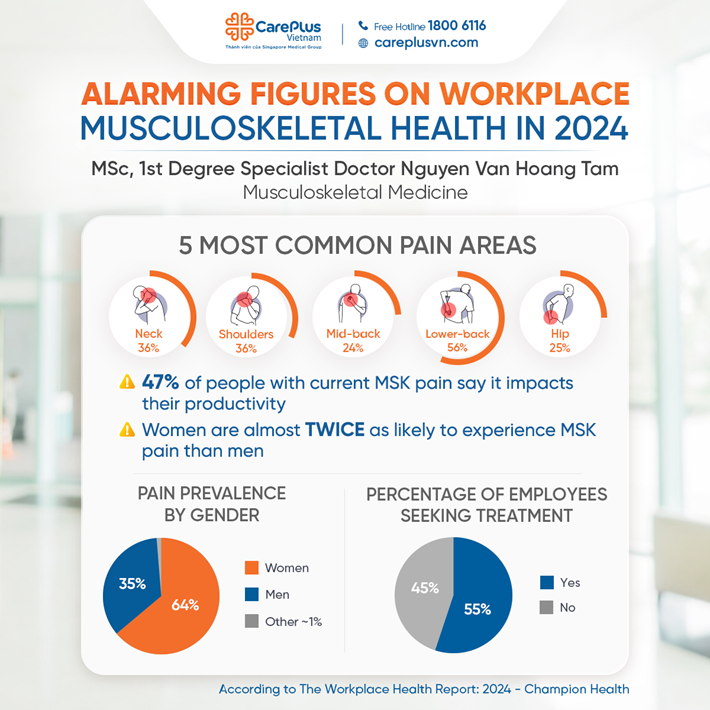ALARMING FIGURES ON WORKPLACE MUSCULOSKELETAL HEALTH IN 2024
Musculoskeletal health is always a priority in the workplace. Reports indicate that up to 47% of employees experience reduced productivity due to muscle pain and joint aches. Discover preventive measures and improvement strategies in the article below!

11/7/2024 2:57:42 PM
✅ This article has been medically reviewed by MSc, 1st Degree Specialist Doctor Nguyen Van Hoang Tam - specialist in Orthopedic and Sports Medicine - Musculoskeletal Health at CarePlus International Clinics.
⛔ Did you know that 47% of employees with musculoskeletal conditions report reduced work productivity?
Musculoskeletal disorders have become a significant health concern in the workplace. "Back pain - knee ache - numb hands" is no longer a lighthearted remark; these symptoms demand serious attention, preventive measures, or timely treatment.
👉 Join CarePlus in exploring the state of workplace musculoskeletal health (based on the 2024 Champion Health Workplace Health Report) in the article below.
1/ Top 5 Musculoskeletal Pain Areas to Watch
🔥 According to Champion Health statistics, five areas are most prone to pain: Neck (36%), Shoulders (32%), Mid-back (24%), Lower back (56%), and Hips (25%).
Joints, where two bones meet, provide flexibility and allow for movement throughout the body. Notably, joints that endure heavy pressure or frequent motion, such as those in the neck, shoulders, back, and hips, are more susceptible to pain and degeneration.
Just as we crave water when thirsty and food when hungry, the feeling of stiffness or pain after prolonged work periods signals that we should stand up, walk around, or perform simple exercises to relax and engage the joints and muscles.
⛔ Additionally, the report indicates that staffs working in a hybrid mode (splitting time between the office and remote work) experience more pain than those working solely from home or the office.
⛔ Nearly half of manual laborers suffer from musculoskeletal pain, highlighting the increased physical strain these roles place on the body compared to other occupations.
2/ Musculoskeletal Condition Prevalence by Gender
❗ Data shows that musculoskeletal conditions affect 64% of women, 35% of men, and 1% of other gender identities. Why is the incidence rate in women nearly double that of men?
.png)
Experts suggest that pregnancy, childbirth, and perimenopause may lead to estrogen deficiency in women, affecting muscle tissue development and bone density. Additionally, the physical changes during pregnancy and childbirth may alter the pelvic floor structure, potentially resulting in pain or an increased risk of conditions like osteoporosis and arthritis.
3/ Treatment Rates Among Employees with Musculoskeletal Conditions
❗ Notably, only 45% of labor force with these conditions receive treatment, while 55% continue to endure pain or face financial constraints that prevent treatment. Tolerating pain not only worsens the condition but also directly impacts work productivity. In fact, 47% of personnel report that muscle and joint pain has significantly reduced their job performance.
Without timely and appropriate treatment, musculoskeletal issues may become chronic, leading to dangerous complications that affect quality of life and work ability.
👉 To prevent and manage common workplace musculoskeletal issues, here are some recommendations from MSc, 1st Degree Specialist Doctor Nguyen Van Hoang Tam.
🔸 Office Workers (who spend 8 hours daily at the computer): Ensure correct sitting posture, use chairs and desks that match your height, take short breaks each hour to stretch, and perform muscle-relaxing exercises.
🔸 Manual Laborers (who frequently lift heavy objects): Learn proper lifting techniques (bend knees, keep back straight), use support equipment (e.g., dollies, conveyors), and maintain physical fitness to relieve stress on the musculoskeletal system.
🔸 Service Industry Workers (who stand or walk frequently): Wear comfortable, well-cushioned shoes to support joints, regularly change positions, and incorporate leg-stretching exercises to prevent strain on knee joints and the spine.
Applying these practices can help reduce the risk of musculoskeletal disorders and enhance occupational health.
👉 If you experience prolonged or unusual pain, do not hesitate to contact CarePlus for timely diagnosis and personalized treatment advice from our team of experienced musculoskeletal specialists.
➡️ Send us a message or call our free hotline at 1800 6116 to book an appointment now!
CAREPLUS INTERNATIONAL CLINICS
Associate of Singapore Medical Group
Hotline: 1800 6116
Email: info@careplusvn.com
Fanpage: CarePlus Clinic Vietnam